Analyzing the Role of ICAC in Australia's Anti-Corruption Strategies
VerifiedAdded on 2020/03/07
|59
|16575
|83
Report
AI Summary
This report delves into the Australian approach to combating corruption, focusing on the Independent Commission Against Corruption (ICAC) in New South Wales. It examines ICAC's structure, functions, and powers, including its investigative and preventative roles within the public sector. The report analyzes the historical development of ICAC, including its legislative framework, jurisdiction, and organizational changes over time. It highlights the evolution of strategies, such as the integration of prevention and education, and the importance of adapting to challenges. Furthermore, the report discusses the broader national integrity system in Australia, assessing the effectiveness of various agencies and identifying deficiencies. The analysis includes comparisons to other integrity bodies, such as the Hong Kong ICAC. This report is a comprehensive overview of ICAC's role in maintaining public sector integrity and preventing corruption in Australia, providing valuable lessons for other jurisdictions, such as Libya, considering similar anti-corruption measures.
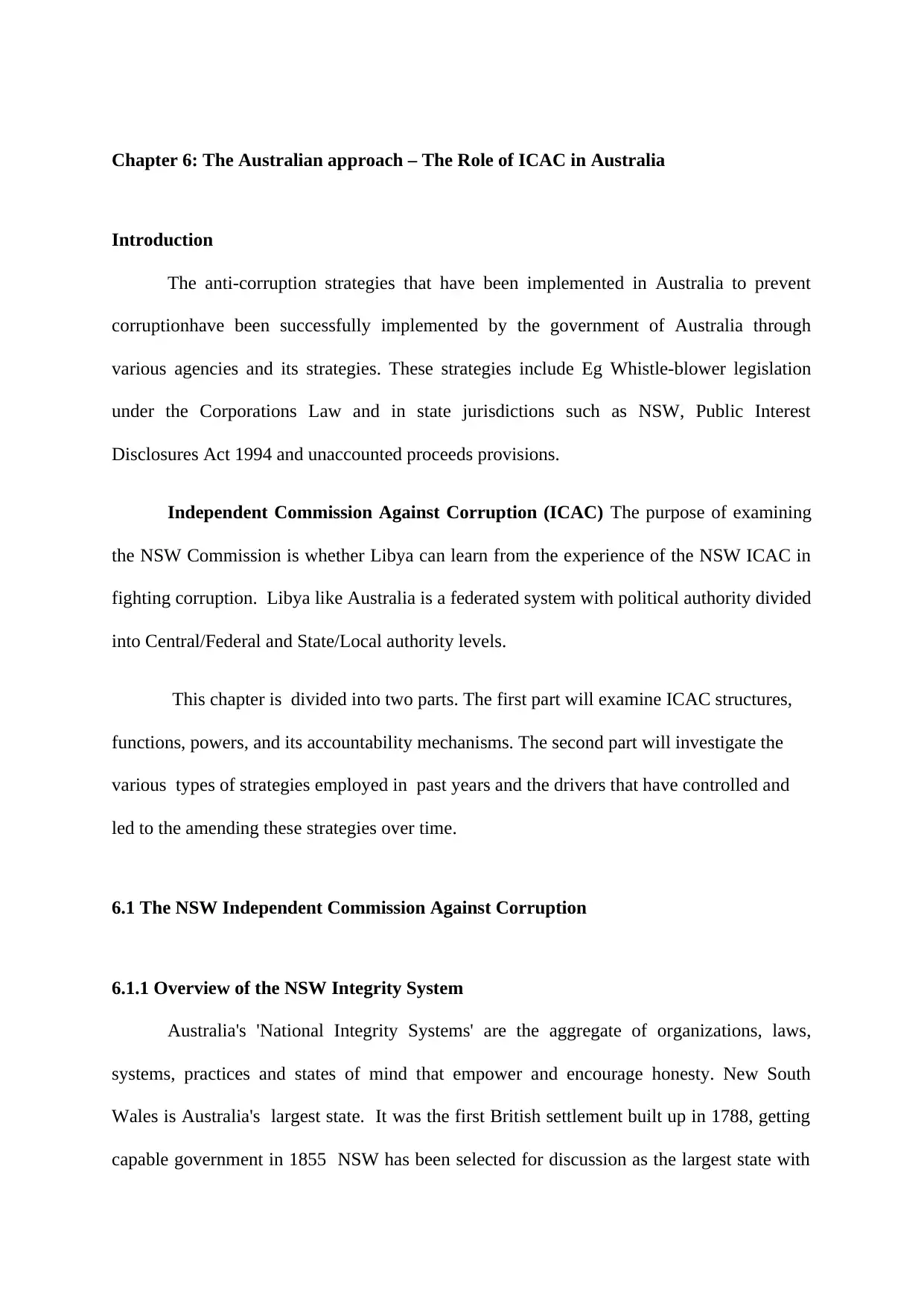
Chapter 6: The Australian approach – The Role of ICAC in Australia
Introduction
The anti-corruption strategies that have been implemented in Australia to prevent
corruptionhave been successfully implemented by the government of Australia through
various agencies and its strategies. These strategies include Eg Whistle-blower legislation
under the Corporations Law and in state jurisdictions such as NSW, Public Interest
Disclosures Act 1994 and unaccounted proceeds provisions.
Independent Commission Against Corruption (ICAC) The purpose of examining
the NSW Commission is whether Libya can learn from the experience of the NSW ICAC in
fighting corruption. Libya like Australia is a federated system with political authority divided
into Central/Federal and State/Local authority levels.
This chapter is divided into two parts. The first part will examine ICAC structures,
functions, powers, and its accountability mechanisms. The second part will investigate the
various types of strategies employed in past years and the drivers that have controlled and
led to the amending these strategies over time.
6.1 The NSW Independent Commission Against Corruption
6.1.1 Overview of the NSW Integrity System
Australia's 'National Integrity Systems' are the aggregate of organizations, laws,
systems, practices and states of mind that empower and encourage honesty. New South
Wales is Australia's largest state. It was the first British settlement built up in 1788, getting
capable government in 1855 NSW has been selected for discussion as the largest state with
Introduction
The anti-corruption strategies that have been implemented in Australia to prevent
corruptionhave been successfully implemented by the government of Australia through
various agencies and its strategies. These strategies include Eg Whistle-blower legislation
under the Corporations Law and in state jurisdictions such as NSW, Public Interest
Disclosures Act 1994 and unaccounted proceeds provisions.
Independent Commission Against Corruption (ICAC) The purpose of examining
the NSW Commission is whether Libya can learn from the experience of the NSW ICAC in
fighting corruption. Libya like Australia is a federated system with political authority divided
into Central/Federal and State/Local authority levels.
This chapter is divided into two parts. The first part will examine ICAC structures,
functions, powers, and its accountability mechanisms. The second part will investigate the
various types of strategies employed in past years and the drivers that have controlled and
led to the amending these strategies over time.
6.1 The NSW Independent Commission Against Corruption
6.1.1 Overview of the NSW Integrity System
Australia's 'National Integrity Systems' are the aggregate of organizations, laws,
systems, practices and states of mind that empower and encourage honesty. New South
Wales is Australia's largest state. It was the first British settlement built up in 1788, getting
capable government in 1855 NSW has been selected for discussion as the largest state with
Paraphrase This Document
Need a fresh take? Get an instant paraphrase of this document with our AI Paraphraser
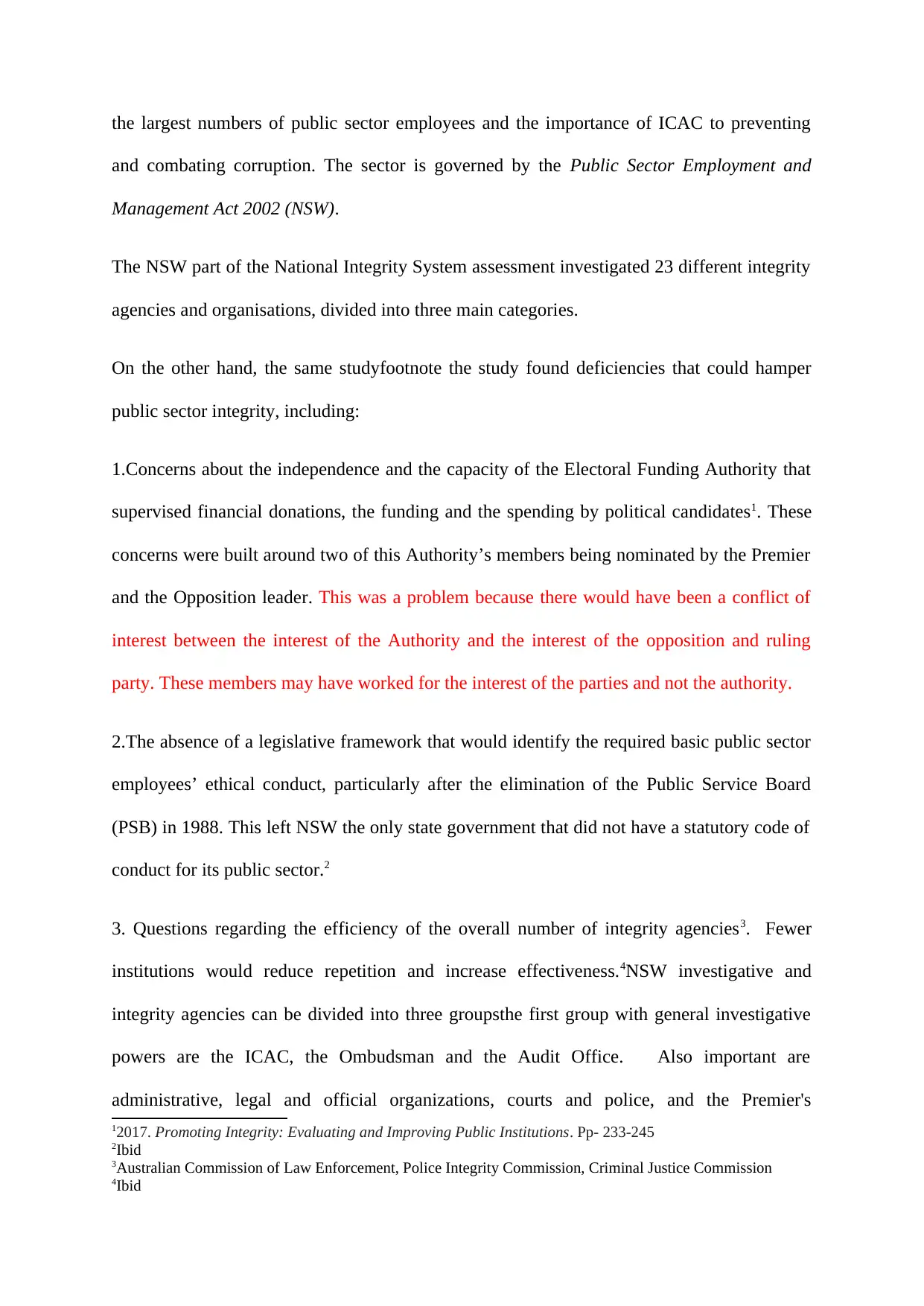
the largest numbers of public sector employees and the importance of ICAC to preventing
and combating corruption. The sector is governed by the Public Sector Employment and
Management Act 2002 (NSW).
The NSW part of the National Integrity System assessment investigated 23 different integrity
agencies and organisations, divided into three main categories.
On the other hand, the same studyfootnote the study found deficiencies that could hamper
public sector integrity, including:
1.Concerns about the independence and the capacity of the Electoral Funding Authority that
supervised financial donations, the funding and the spending by political candidates1. These
concerns were built around two of this Authority’s members being nominated by the Premier
and the Opposition leader. This was a problem because there would have been a conflict of
interest between the interest of the Authority and the interest of the opposition and ruling
party. These members may have worked for the interest of the parties and not the authority.
2.The absence of a legislative framework that would identify the required basic public sector
employees’ ethical conduct, particularly after the elimination of the Public Service Board
(PSB) in 1988. This left NSW the only state government that did not have a statutory code of
conduct for its public sector.2
3. Questions regarding the efficiency of the overall number of integrity agencies3. Fewer
institutions would reduce repetition and increase effectiveness.4NSW investigative and
integrity agencies can be divided into three groupsthe first group with general investigative
powers are the ICAC, the Ombudsman and the Audit Office. Also important are
administrative, legal and official organizations, courts and police, and the Premier's
12017. Promoting Integrity: Evaluating and Improving Public Institutions. Pp- 233-245
2Ibid
3Australian Commission of Law Enforcement, Police Integrity Commission, Criminal Justice Commission
4Ibid
and combating corruption. The sector is governed by the Public Sector Employment and
Management Act 2002 (NSW).
The NSW part of the National Integrity System assessment investigated 23 different integrity
agencies and organisations, divided into three main categories.
On the other hand, the same studyfootnote the study found deficiencies that could hamper
public sector integrity, including:
1.Concerns about the independence and the capacity of the Electoral Funding Authority that
supervised financial donations, the funding and the spending by political candidates1. These
concerns were built around two of this Authority’s members being nominated by the Premier
and the Opposition leader. This was a problem because there would have been a conflict of
interest between the interest of the Authority and the interest of the opposition and ruling
party. These members may have worked for the interest of the parties and not the authority.
2.The absence of a legislative framework that would identify the required basic public sector
employees’ ethical conduct, particularly after the elimination of the Public Service Board
(PSB) in 1988. This left NSW the only state government that did not have a statutory code of
conduct for its public sector.2
3. Questions regarding the efficiency of the overall number of integrity agencies3. Fewer
institutions would reduce repetition and increase effectiveness.4NSW investigative and
integrity agencies can be divided into three groupsthe first group with general investigative
powers are the ICAC, the Ombudsman and the Audit Office. Also important are
administrative, legal and official organizations, courts and police, and the Premier's
12017. Promoting Integrity: Evaluating and Improving Public Institutions. Pp- 233-245
2Ibid
3Australian Commission of Law Enforcement, Police Integrity Commission, Criminal Justice Commission
4Ibid
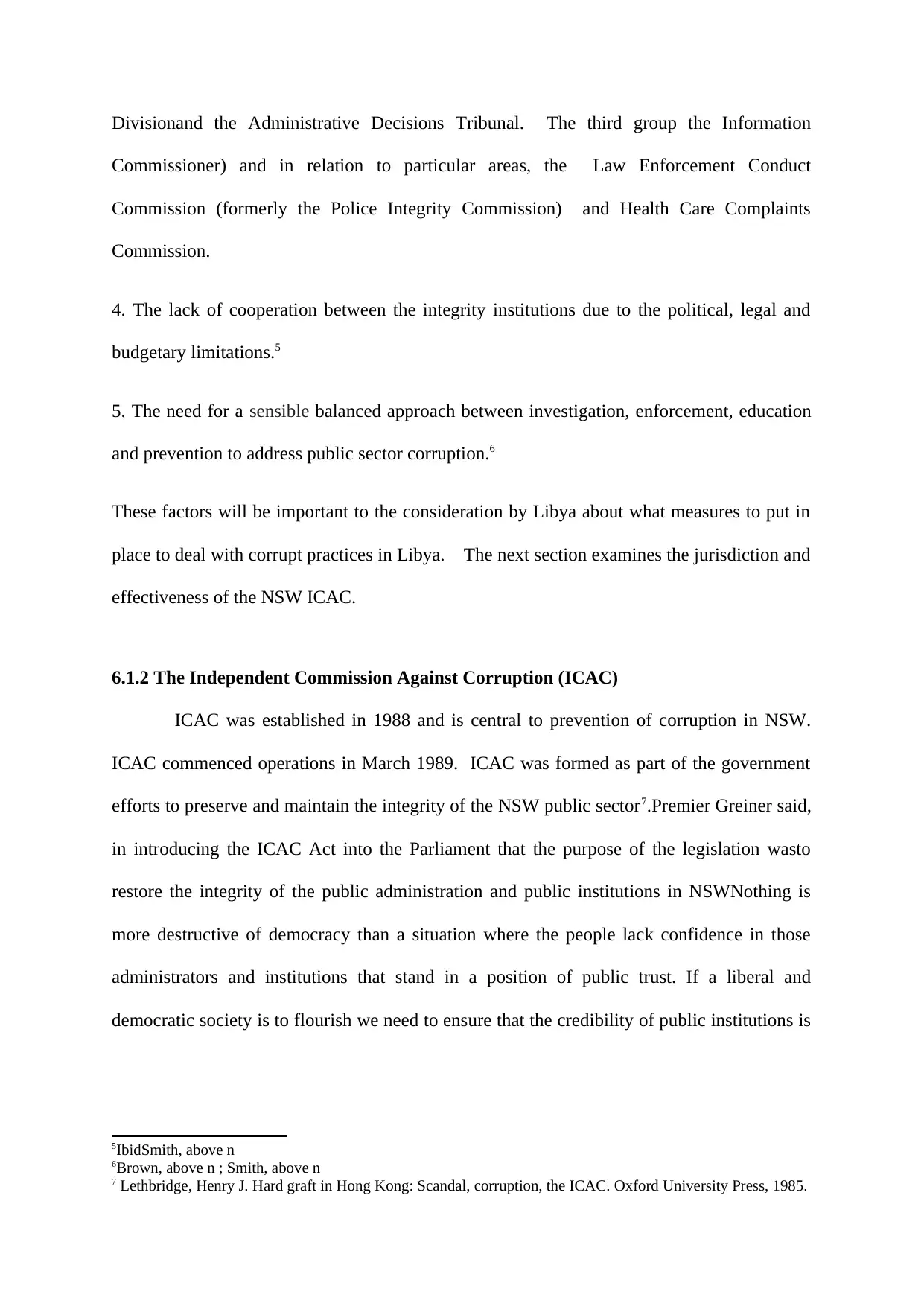
Divisionand the Administrative Decisions Tribunal. The third group the Information
Commissioner) and in relation to particular areas, the Law Enforcement Conduct
Commission (formerly the Police Integrity Commission) and Health Care Complaints
Commission.
4. The lack of cooperation between the integrity institutions due to the political, legal and
budgetary limitations.5
5. The need for a sensible balanced approach between investigation, enforcement, education
and prevention to address public sector corruption.6
These factors will be important to the consideration by Libya about what measures to put in
place to deal with corrupt practices in Libya. The next section examines the jurisdiction and
effectiveness of the NSW ICAC.
6.1.2 The Independent Commission Against Corruption (ICAC)
ICAC was established in 1988 and is central to prevention of corruption in NSW.
ICAC commenced operations in March 1989. ICAC was formed as part of the government
efforts to preserve and maintain the integrity of the NSW public sector7.Premier Greiner said,
in introducing the ICAC Act into the Parliament that the purpose of the legislation wasto
restore the integrity of the public administration and public institutions in NSWNothing is
more destructive of democracy than a situation where the people lack confidence in those
administrators and institutions that stand in a position of public trust. If a liberal and
democratic society is to flourish we need to ensure that the credibility of public institutions is
5IbidSmith, above n
6Brown, above n ; Smith, above n
7 Lethbridge, Henry J. Hard graft in Hong Kong: Scandal, corruption, the ICAC. Oxford University Press, 1985.
Commissioner) and in relation to particular areas, the Law Enforcement Conduct
Commission (formerly the Police Integrity Commission) and Health Care Complaints
Commission.
4. The lack of cooperation between the integrity institutions due to the political, legal and
budgetary limitations.5
5. The need for a sensible balanced approach between investigation, enforcement, education
and prevention to address public sector corruption.6
These factors will be important to the consideration by Libya about what measures to put in
place to deal with corrupt practices in Libya. The next section examines the jurisdiction and
effectiveness of the NSW ICAC.
6.1.2 The Independent Commission Against Corruption (ICAC)
ICAC was established in 1988 and is central to prevention of corruption in NSW.
ICAC commenced operations in March 1989. ICAC was formed as part of the government
efforts to preserve and maintain the integrity of the NSW public sector7.Premier Greiner said,
in introducing the ICAC Act into the Parliament that the purpose of the legislation wasto
restore the integrity of the public administration and public institutions in NSWNothing is
more destructive of democracy than a situation where the people lack confidence in those
administrators and institutions that stand in a position of public trust. If a liberal and
democratic society is to flourish we need to ensure that the credibility of public institutions is
5IbidSmith, above n
6Brown, above n ; Smith, above n
7 Lethbridge, Henry J. Hard graft in Hong Kong: Scandal, corruption, the ICAC. Oxford University Press, 1985.
⊘ This is a preview!⊘
Do you want full access?
Subscribe today to unlock all pages.

Trusted by 1+ million students worldwide
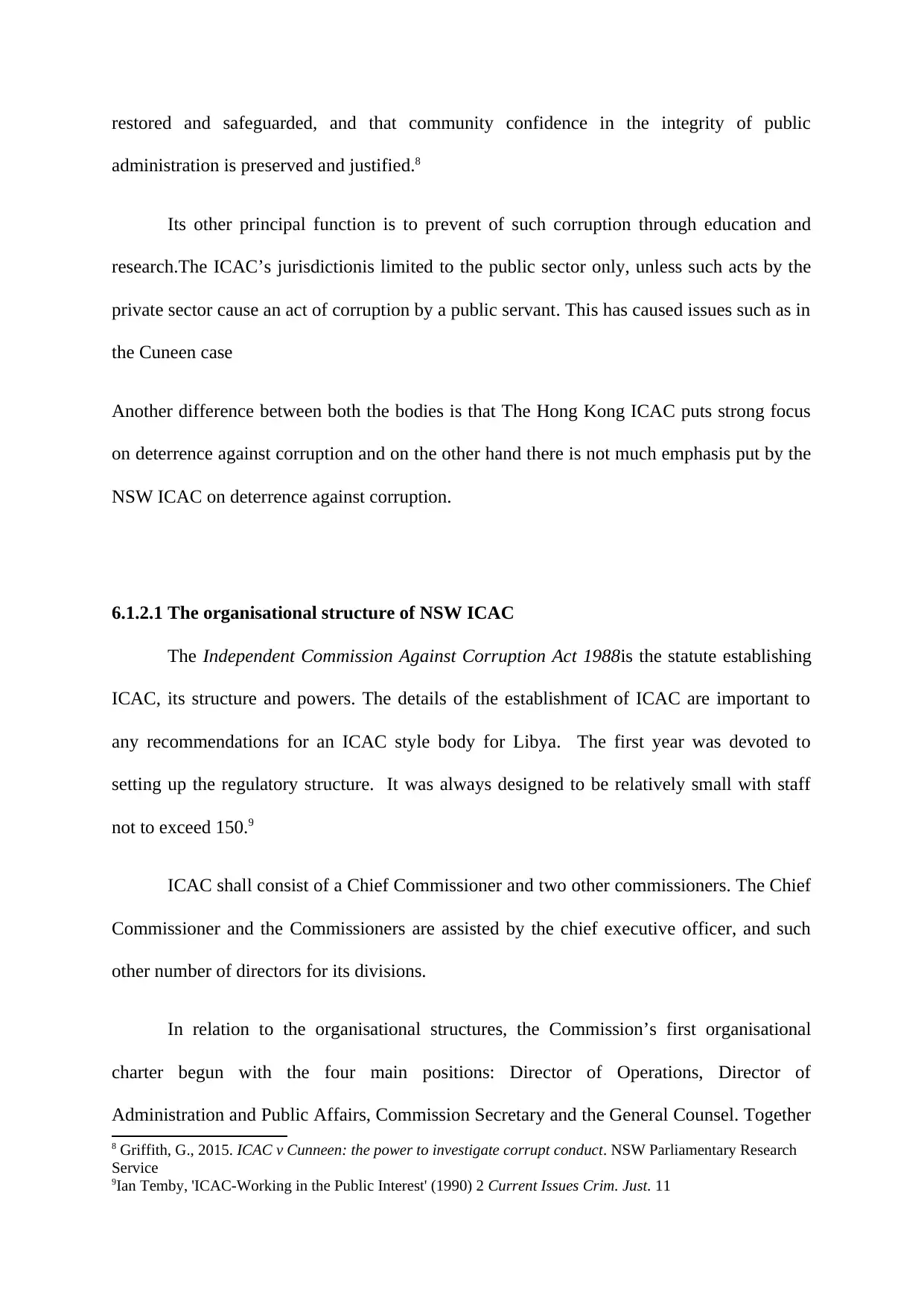
restored and safeguarded, and that community confidence in the integrity of public
administration is preserved and justified.8
Its other principal function is to prevent of such corruption through education and
research.The ICAC’s jurisdictionis limited to the public sector only, unless such acts by the
private sector cause an act of corruption by a public servant. This has caused issues such as in
the Cuneen case
Another difference between both the bodies is that The Hong Kong ICAC puts strong focus
on deterrence against corruption and on the other hand there is not much emphasis put by the
NSW ICAC on deterrence against corruption.
6.1.2.1 The organisational structure of NSW ICAC
The Independent Commission Against Corruption Act 1988is the statute establishing
ICAC, its structure and powers. The details of the establishment of ICAC are important to
any recommendations for an ICAC style body for Libya. The first year was devoted to
setting up the regulatory structure. It was always designed to be relatively small with staff
not to exceed 150.9
ICAC shall consist of a Chief Commissioner and two other commissioners. The Chief
Commissioner and the Commissioners are assisted by the chief executive officer, and such
other number of directors for its divisions.
In relation to the organisational structures, the Commission’s first organisational
charter begun with the four main positions: Director of Operations, Director of
Administration and Public Affairs, Commission Secretary and the General Counsel. Together
8 Griffith, G., 2015. ICAC v Cunneen: the power to investigate corrupt conduct. NSW Parliamentary Research
Service
9Ian Temby, 'ICAC-Working in the Public Interest' (1990) 2 Current Issues Crim. Just. 11
administration is preserved and justified.8
Its other principal function is to prevent of such corruption through education and
research.The ICAC’s jurisdictionis limited to the public sector only, unless such acts by the
private sector cause an act of corruption by a public servant. This has caused issues such as in
the Cuneen case
Another difference between both the bodies is that The Hong Kong ICAC puts strong focus
on deterrence against corruption and on the other hand there is not much emphasis put by the
NSW ICAC on deterrence against corruption.
6.1.2.1 The organisational structure of NSW ICAC
The Independent Commission Against Corruption Act 1988is the statute establishing
ICAC, its structure and powers. The details of the establishment of ICAC are important to
any recommendations for an ICAC style body for Libya. The first year was devoted to
setting up the regulatory structure. It was always designed to be relatively small with staff
not to exceed 150.9
ICAC shall consist of a Chief Commissioner and two other commissioners. The Chief
Commissioner and the Commissioners are assisted by the chief executive officer, and such
other number of directors for its divisions.
In relation to the organisational structures, the Commission’s first organisational
charter begun with the four main positions: Director of Operations, Director of
Administration and Public Affairs, Commission Secretary and the General Counsel. Together
8 Griffith, G., 2015. ICAC v Cunneen: the power to investigate corrupt conduct. NSW Parliamentary Research
Service
9Ian Temby, 'ICAC-Working in the Public Interest' (1990) 2 Current Issues Crim. Just. 11
Paraphrase This Document
Need a fresh take? Get an instant paraphrase of this document with our AI Paraphraser
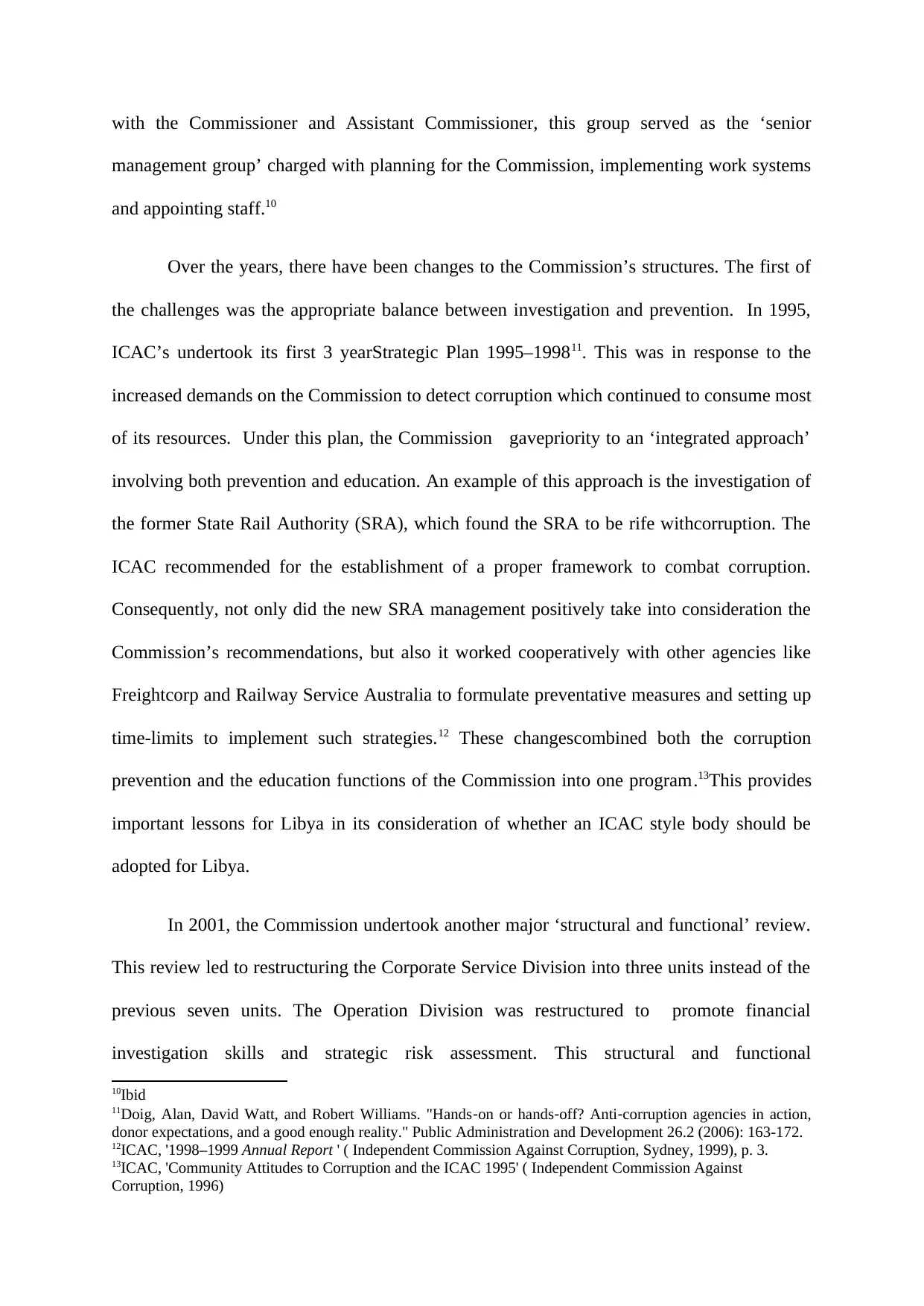
with the Commissioner and Assistant Commissioner, this group served as the ‘senior
management group’ charged with planning for the Commission, implementing work systems
and appointing staff.10
Over the years, there have been changes to the Commission’s structures. The first of
the challenges was the appropriate balance between investigation and prevention. In 1995,
ICAC’s undertook its first 3 yearStrategic Plan 1995–199811. This was in response to the
increased demands on the Commission to detect corruption which continued to consume most
of its resources. Under this plan, the Commission gavepriority to an ‘integrated approach’
involving both prevention and education. An example of this approach is the investigation of
the former State Rail Authority (SRA), which found the SRA to be rife withcorruption. The
ICAC recommended for the establishment of a proper framework to combat corruption.
Consequently, not only did the new SRA management positively take into consideration the
Commission’s recommendations, but also it worked cooperatively with other agencies like
Freightcorp and Railway Service Australia to formulate preventative measures and setting up
time-limits to implement such strategies.12 These changescombined both the corruption
prevention and the education functions of the Commission into one program.13This provides
important lessons for Libya in its consideration of whether an ICAC style body should be
adopted for Libya.
In 2001, the Commission undertook another major ‘structural and functional’ review.
This review led to restructuring the Corporate Service Division into three units instead of the
previous seven units. The Operation Division was restructured to promote financial
investigation skills and strategic risk assessment. This structural and functional
10Ibid
11Doig, Alan, David Watt, and Robert Williams. "Hands‐on or hands‐off? Anti‐corruption agencies in action,
donor expectations, and a good enough reality." Public Administration and Development 26.2 (2006): 163-172.
12ICAC, '1998–1999 Annual Report ' ( Independent Commission Against Corruption, Sydney, 1999), p. 3.
13ICAC, 'Community Attitudes to Corruption and the ICAC 1995' ( Independent Commission Against
Corruption, 1996)
management group’ charged with planning for the Commission, implementing work systems
and appointing staff.10
Over the years, there have been changes to the Commission’s structures. The first of
the challenges was the appropriate balance between investigation and prevention. In 1995,
ICAC’s undertook its first 3 yearStrategic Plan 1995–199811. This was in response to the
increased demands on the Commission to detect corruption which continued to consume most
of its resources. Under this plan, the Commission gavepriority to an ‘integrated approach’
involving both prevention and education. An example of this approach is the investigation of
the former State Rail Authority (SRA), which found the SRA to be rife withcorruption. The
ICAC recommended for the establishment of a proper framework to combat corruption.
Consequently, not only did the new SRA management positively take into consideration the
Commission’s recommendations, but also it worked cooperatively with other agencies like
Freightcorp and Railway Service Australia to formulate preventative measures and setting up
time-limits to implement such strategies.12 These changescombined both the corruption
prevention and the education functions of the Commission into one program.13This provides
important lessons for Libya in its consideration of whether an ICAC style body should be
adopted for Libya.
In 2001, the Commission undertook another major ‘structural and functional’ review.
This review led to restructuring the Corporate Service Division into three units instead of the
previous seven units. The Operation Division was restructured to promote financial
investigation skills and strategic risk assessment. This structural and functional
10Ibid
11Doig, Alan, David Watt, and Robert Williams. "Hands‐on or hands‐off? Anti‐corruption agencies in action,
donor expectations, and a good enough reality." Public Administration and Development 26.2 (2006): 163-172.
12ICAC, '1998–1999 Annual Report ' ( Independent Commission Against Corruption, Sydney, 1999), p. 3.
13ICAC, 'Community Attitudes to Corruption and the ICAC 1995' ( Independent Commission Against
Corruption, 1996)
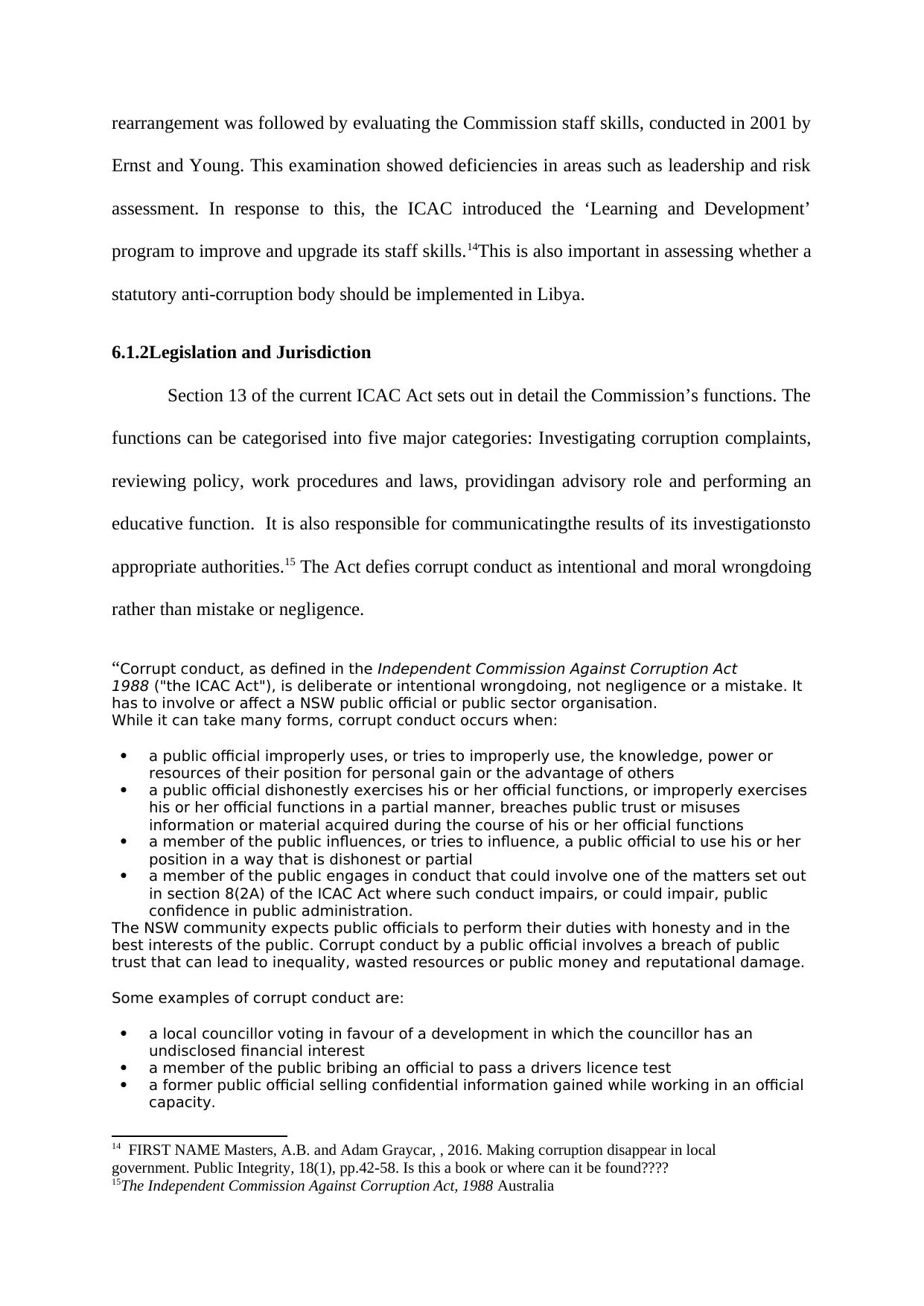
rearrangement was followed by evaluating the Commission staff skills, conducted in 2001 by
Ernst and Young. This examination showed deficiencies in areas such as leadership and risk
assessment. In response to this, the ICAC introduced the ‘Learning and Development’
program to improve and upgrade its staff skills.14This is also important in assessing whether a
statutory anti-corruption body should be implemented in Libya.
6.1.2Legislation and Jurisdiction
Section 13 of the current ICAC Act sets out in detail the Commission’s functions. The
functions can be categorised into five major categories: Investigating corruption complaints,
reviewing policy, work procedures and laws, providingan advisory role and performing an
educative function. It is also responsible for communicatingthe results of its investigationsto
appropriate authorities.15 The Act defies corrupt conduct as intentional and moral wrongdoing
rather than mistake or negligence.
“Corrupt conduct, as defined in the Independent Commission Against Corruption Act
1988 ("the ICAC Act"), is deliberate or intentional wrongdoing, not negligence or a mistake. It
has to involve or affect a NSW public official or public sector organisation.
While it can take many forms, corrupt conduct occurs when:
a public official improperly uses, or tries to improperly use, the knowledge, power or
resources of their position for personal gain or the advantage of others
a public official dishonestly exercises his or her official functions, or improperly exercises
his or her official functions in a partial manner, breaches public trust or misuses
information or material acquired during the course of his or her official functions
a member of the public influences, or tries to influence, a public official to use his or her
position in a way that is dishonest or partial
a member of the public engages in conduct that could involve one of the matters set out
in section 8(2A) of the ICAC Act where such conduct impairs, or could impair, public
confidence in public administration.
The NSW community expects public officials to perform their duties with honesty and in the
best interests of the public. Corrupt conduct by a public official involves a breach of public
trust that can lead to inequality, wasted resources or public money and reputational damage.
Some examples of corrupt conduct are:
a local councillor voting in favour of a development in which the councillor has an
undisclosed financial interest
a member of the public bribing an official to pass a drivers licence test
a former public official selling confidential information gained while working in an official
capacity.
14 FIRST NAME Masters, A.B. and Adam Graycar, , 2016. Making corruption disappear in local
government. Public Integrity, 18(1), pp.42-58. Is this a book or where can it be found????
15The Independent Commission Against Corruption Act, 1988 Australia
Ernst and Young. This examination showed deficiencies in areas such as leadership and risk
assessment. In response to this, the ICAC introduced the ‘Learning and Development’
program to improve and upgrade its staff skills.14This is also important in assessing whether a
statutory anti-corruption body should be implemented in Libya.
6.1.2Legislation and Jurisdiction
Section 13 of the current ICAC Act sets out in detail the Commission’s functions. The
functions can be categorised into five major categories: Investigating corruption complaints,
reviewing policy, work procedures and laws, providingan advisory role and performing an
educative function. It is also responsible for communicatingthe results of its investigationsto
appropriate authorities.15 The Act defies corrupt conduct as intentional and moral wrongdoing
rather than mistake or negligence.
“Corrupt conduct, as defined in the Independent Commission Against Corruption Act
1988 ("the ICAC Act"), is deliberate or intentional wrongdoing, not negligence or a mistake. It
has to involve or affect a NSW public official or public sector organisation.
While it can take many forms, corrupt conduct occurs when:
a public official improperly uses, or tries to improperly use, the knowledge, power or
resources of their position for personal gain or the advantage of others
a public official dishonestly exercises his or her official functions, or improperly exercises
his or her official functions in a partial manner, breaches public trust or misuses
information or material acquired during the course of his or her official functions
a member of the public influences, or tries to influence, a public official to use his or her
position in a way that is dishonest or partial
a member of the public engages in conduct that could involve one of the matters set out
in section 8(2A) of the ICAC Act where such conduct impairs, or could impair, public
confidence in public administration.
The NSW community expects public officials to perform their duties with honesty and in the
best interests of the public. Corrupt conduct by a public official involves a breach of public
trust that can lead to inequality, wasted resources or public money and reputational damage.
Some examples of corrupt conduct are:
a local councillor voting in favour of a development in which the councillor has an
undisclosed financial interest
a member of the public bribing an official to pass a drivers licence test
a former public official selling confidential information gained while working in an official
capacity.
14 FIRST NAME Masters, A.B. and Adam Graycar, , 2016. Making corruption disappear in local
government. Public Integrity, 18(1), pp.42-58. Is this a book or where can it be found????
15The Independent Commission Against Corruption Act, 1988 Australia
⊘ This is a preview!⊘
Do you want full access?
Subscribe today to unlock all pages.

Trusted by 1+ million students worldwide
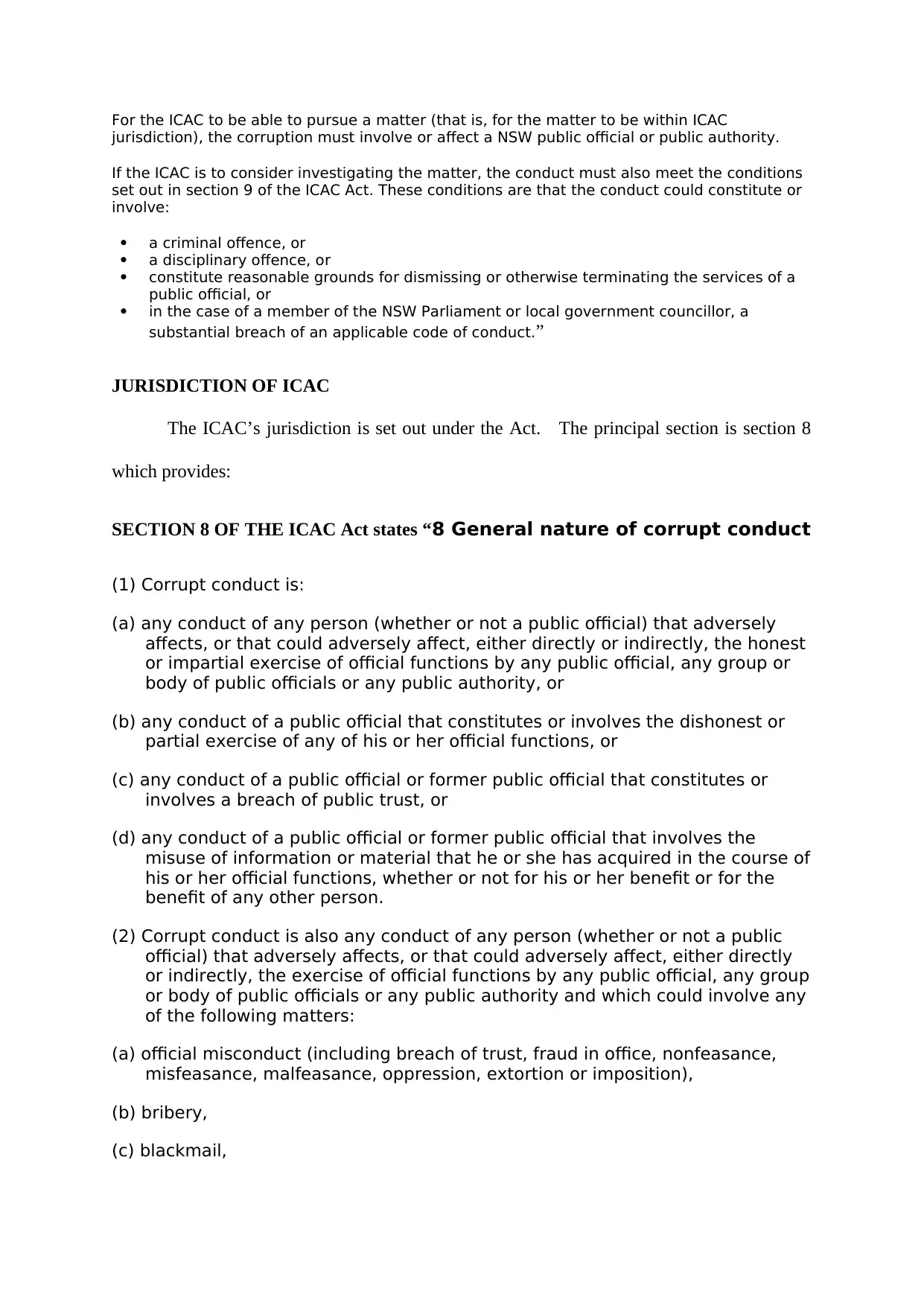
For the ICAC to be able to pursue a matter (that is, for the matter to be within ICAC
jurisdiction), the corruption must involve or affect a NSW public official or public authority.
If the ICAC is to consider investigating the matter, the conduct must also meet the conditions
set out in section 9 of the ICAC Act. These conditions are that the conduct could constitute or
involve:
a criminal offence, or
a disciplinary offence, or
constitute reasonable grounds for dismissing or otherwise terminating the services of a
public official, or
in the case of a member of the NSW Parliament or local government councillor, a
substantial breach of an applicable code of conduct.”
JURISDICTION OF ICAC
The ICAC’s jurisdiction is set out under the Act. The principal section is section 8
which provides:
SECTION 8 OF THE ICAC Act states “8 General nature of corrupt conduct
(1) Corrupt conduct is:
(a) any conduct of any person (whether or not a public official) that adversely
affects, or that could adversely affect, either directly or indirectly, the honest
or impartial exercise of official functions by any public official, any group or
body of public officials or any public authority, or
(b) any conduct of a public official that constitutes or involves the dishonest or
partial exercise of any of his or her official functions, or
(c) any conduct of a public official or former public official that constitutes or
involves a breach of public trust, or
(d) any conduct of a public official or former public official that involves the
misuse of information or material that he or she has acquired in the course of
his or her official functions, whether or not for his or her benefit or for the
benefit of any other person.
(2) Corrupt conduct is also any conduct of any person (whether or not a public
official) that adversely affects, or that could adversely affect, either directly
or indirectly, the exercise of official functions by any public official, any group
or body of public officials or any public authority and which could involve any
of the following matters:
(a) official misconduct (including breach of trust, fraud in office, nonfeasance,
misfeasance, malfeasance, oppression, extortion or imposition),
(b) bribery,
(c) blackmail,
jurisdiction), the corruption must involve or affect a NSW public official or public authority.
If the ICAC is to consider investigating the matter, the conduct must also meet the conditions
set out in section 9 of the ICAC Act. These conditions are that the conduct could constitute or
involve:
a criminal offence, or
a disciplinary offence, or
constitute reasonable grounds for dismissing or otherwise terminating the services of a
public official, or
in the case of a member of the NSW Parliament or local government councillor, a
substantial breach of an applicable code of conduct.”
JURISDICTION OF ICAC
The ICAC’s jurisdiction is set out under the Act. The principal section is section 8
which provides:
SECTION 8 OF THE ICAC Act states “8 General nature of corrupt conduct
(1) Corrupt conduct is:
(a) any conduct of any person (whether or not a public official) that adversely
affects, or that could adversely affect, either directly or indirectly, the honest
or impartial exercise of official functions by any public official, any group or
body of public officials or any public authority, or
(b) any conduct of a public official that constitutes or involves the dishonest or
partial exercise of any of his or her official functions, or
(c) any conduct of a public official or former public official that constitutes or
involves a breach of public trust, or
(d) any conduct of a public official or former public official that involves the
misuse of information or material that he or she has acquired in the course of
his or her official functions, whether or not for his or her benefit or for the
benefit of any other person.
(2) Corrupt conduct is also any conduct of any person (whether or not a public
official) that adversely affects, or that could adversely affect, either directly
or indirectly, the exercise of official functions by any public official, any group
or body of public officials or any public authority and which could involve any
of the following matters:
(a) official misconduct (including breach of trust, fraud in office, nonfeasance,
misfeasance, malfeasance, oppression, extortion or imposition),
(b) bribery,
(c) blackmail,
Paraphrase This Document
Need a fresh take? Get an instant paraphrase of this document with our AI Paraphraser
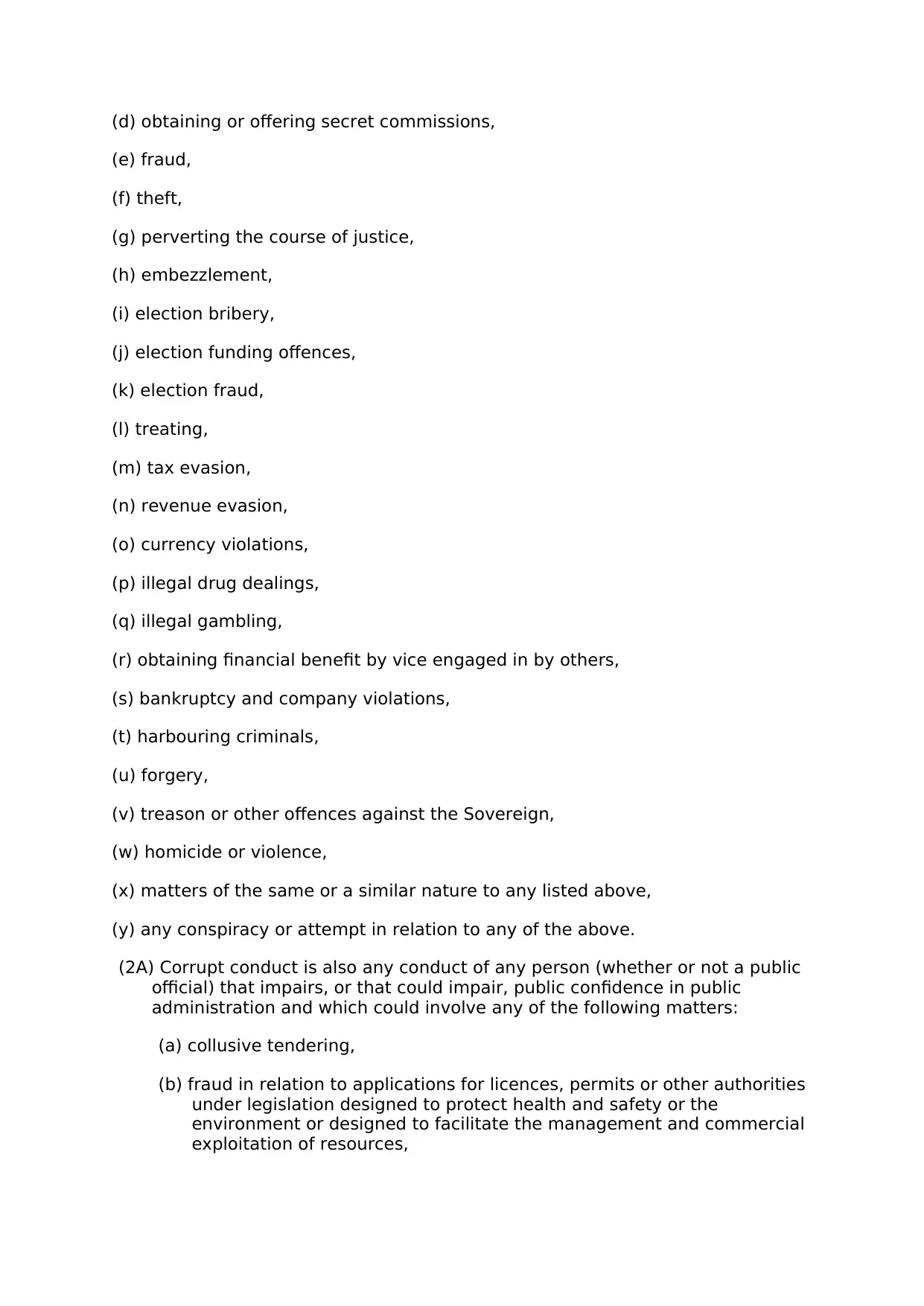
(d) obtaining or offering secret commissions,
(e) fraud,
(f) theft,
(g) perverting the course of justice,
(h) embezzlement,
(i) election bribery,
(j) election funding offences,
(k) election fraud,
(l) treating,
(m) tax evasion,
(n) revenue evasion,
(o) currency violations,
(p) illegal drug dealings,
(q) illegal gambling,
(r) obtaining financial benefit by vice engaged in by others,
(s) bankruptcy and company violations,
(t) harbouring criminals,
(u) forgery,
(v) treason or other offences against the Sovereign,
(w) homicide or violence,
(x) matters of the same or a similar nature to any listed above,
(y) any conspiracy or attempt in relation to any of the above.
(2A) Corrupt conduct is also any conduct of any person (whether or not a public
official) that impairs, or that could impair, public confidence in public
administration and which could involve any of the following matters:
(a) collusive tendering,
(b) fraud in relation to applications for licences, permits or other authorities
under legislation designed to protect health and safety or the
environment or designed to facilitate the management and commercial
exploitation of resources,
(e) fraud,
(f) theft,
(g) perverting the course of justice,
(h) embezzlement,
(i) election bribery,
(j) election funding offences,
(k) election fraud,
(l) treating,
(m) tax evasion,
(n) revenue evasion,
(o) currency violations,
(p) illegal drug dealings,
(q) illegal gambling,
(r) obtaining financial benefit by vice engaged in by others,
(s) bankruptcy and company violations,
(t) harbouring criminals,
(u) forgery,
(v) treason or other offences against the Sovereign,
(w) homicide or violence,
(x) matters of the same or a similar nature to any listed above,
(y) any conspiracy or attempt in relation to any of the above.
(2A) Corrupt conduct is also any conduct of any person (whether or not a public
official) that impairs, or that could impair, public confidence in public
administration and which could involve any of the following matters:
(a) collusive tendering,
(b) fraud in relation to applications for licences, permits or other authorities
under legislation designed to protect health and safety or the
environment or designed to facilitate the management and commercial
exploitation of resources,
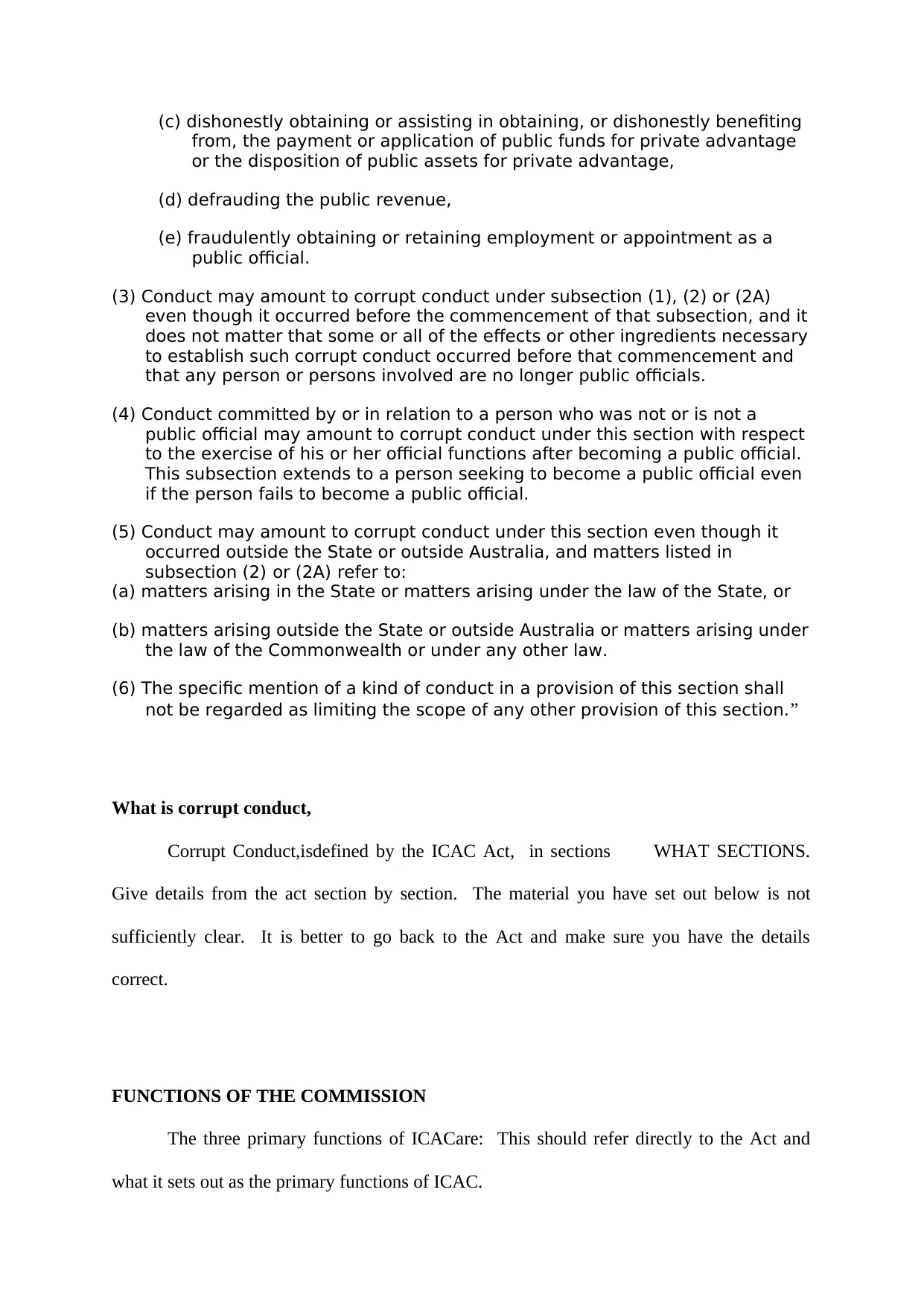
(c) dishonestly obtaining or assisting in obtaining, or dishonestly benefiting
from, the payment or application of public funds for private advantage
or the disposition of public assets for private advantage,
(d) defrauding the public revenue,
(e) fraudulently obtaining or retaining employment or appointment as a
public official.
(3) Conduct may amount to corrupt conduct under subsection (1), (2) or (2A)
even though it occurred before the commencement of that subsection, and it
does not matter that some or all of the effects or other ingredients necessary
to establish such corrupt conduct occurred before that commencement and
that any person or persons involved are no longer public officials.
(4) Conduct committed by or in relation to a person who was not or is not a
public official may amount to corrupt conduct under this section with respect
to the exercise of his or her official functions after becoming a public official.
This subsection extends to a person seeking to become a public official even
if the person fails to become a public official.
(5) Conduct may amount to corrupt conduct under this section even though it
occurred outside the State or outside Australia, and matters listed in
subsection (2) or (2A) refer to:
(a) matters arising in the State or matters arising under the law of the State, or
(b) matters arising outside the State or outside Australia or matters arising under
the law of the Commonwealth or under any other law.
(6) The specific mention of a kind of conduct in a provision of this section shall
not be regarded as limiting the scope of any other provision of this section.”
What is corrupt conduct,
Corrupt Conduct,isdefined by the ICAC Act, in sections WHAT SECTIONS.
Give details from the act section by section. The material you have set out below is not
sufficiently clear. It is better to go back to the Act and make sure you have the details
correct.
FUNCTIONS OF THE COMMISSION
The three primary functions of ICACare: This should refer directly to the Act and
what it sets out as the primary functions of ICAC.
from, the payment or application of public funds for private advantage
or the disposition of public assets for private advantage,
(d) defrauding the public revenue,
(e) fraudulently obtaining or retaining employment or appointment as a
public official.
(3) Conduct may amount to corrupt conduct under subsection (1), (2) or (2A)
even though it occurred before the commencement of that subsection, and it
does not matter that some or all of the effects or other ingredients necessary
to establish such corrupt conduct occurred before that commencement and
that any person or persons involved are no longer public officials.
(4) Conduct committed by or in relation to a person who was not or is not a
public official may amount to corrupt conduct under this section with respect
to the exercise of his or her official functions after becoming a public official.
This subsection extends to a person seeking to become a public official even
if the person fails to become a public official.
(5) Conduct may amount to corrupt conduct under this section even though it
occurred outside the State or outside Australia, and matters listed in
subsection (2) or (2A) refer to:
(a) matters arising in the State or matters arising under the law of the State, or
(b) matters arising outside the State or outside Australia or matters arising under
the law of the Commonwealth or under any other law.
(6) The specific mention of a kind of conduct in a provision of this section shall
not be regarded as limiting the scope of any other provision of this section.”
What is corrupt conduct,
Corrupt Conduct,isdefined by the ICAC Act, in sections WHAT SECTIONS.
Give details from the act section by section. The material you have set out below is not
sufficiently clear. It is better to go back to the Act and make sure you have the details
correct.
FUNCTIONS OF THE COMMISSION
The three primary functions of ICACare: This should refer directly to the Act and
what it sets out as the primary functions of ICAC.
⊘ This is a preview!⊘
Do you want full access?
Subscribe today to unlock all pages.

Trusted by 1+ million students worldwide
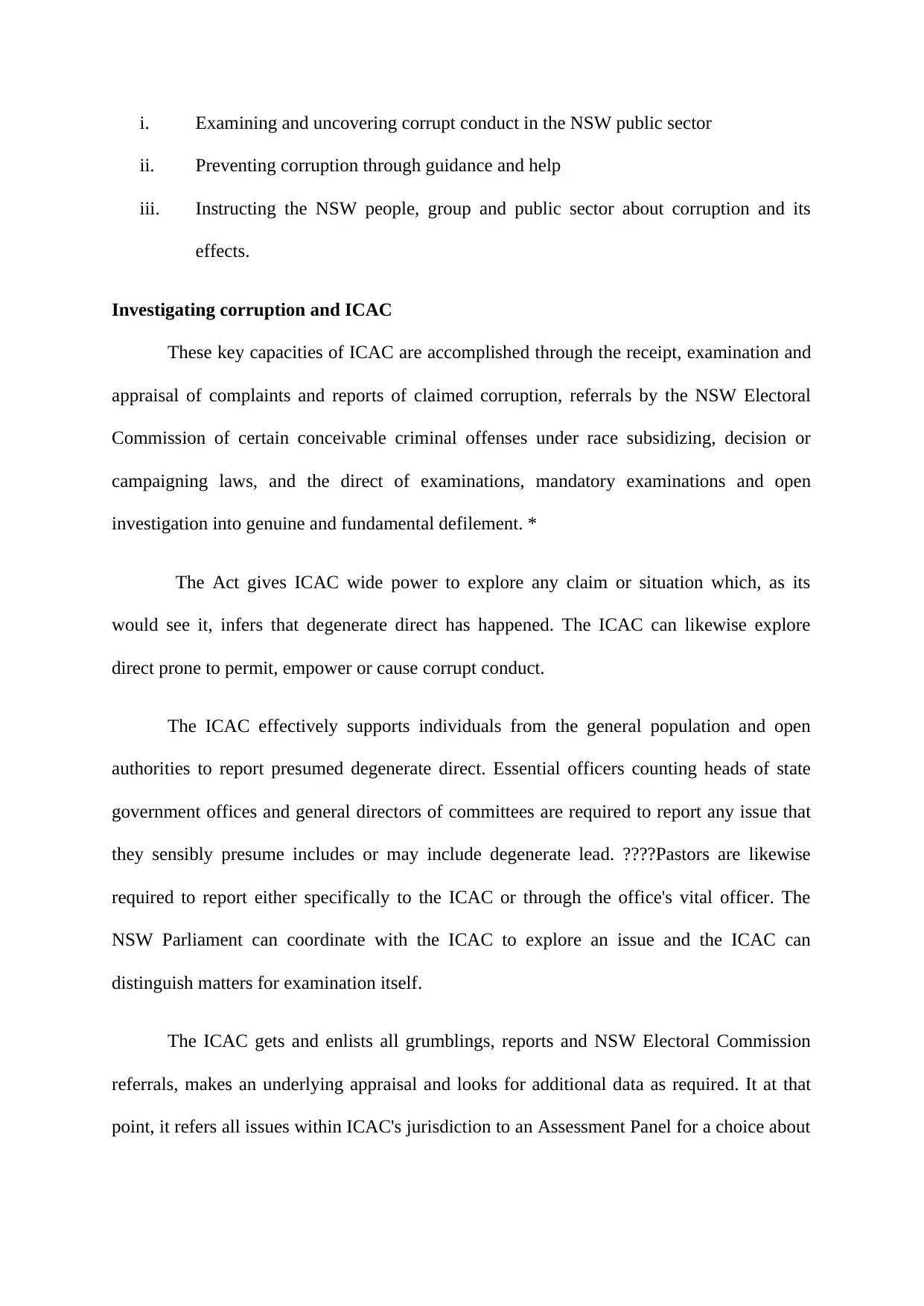
i. Examining and uncovering corrupt conduct in the NSW public sector
ii. Preventing corruption through guidance and help
iii. Instructing the NSW people, group and public sector about corruption and its
effects.
Investigating corruption and ICAC
These key capacities of ICAC are accomplished through the receipt, examination and
appraisal of complaints and reports of claimed corruption, referrals by the NSW Electoral
Commission of certain conceivable criminal offenses under race subsidizing, decision or
campaigning laws, and the direct of examinations, mandatory examinations and open
investigation into genuine and fundamental defilement. *
The Act gives ICAC wide power to explore any claim or situation which, as its
would see it, infers that degenerate direct has happened. The ICAC can likewise explore
direct prone to permit, empower or cause corrupt conduct.
The ICAC effectively supports individuals from the general population and open
authorities to report presumed degenerate direct. Essential officers counting heads of state
government offices and general directors of committees are required to report any issue that
they sensibly presume includes or may include degenerate lead. ????Pastors are likewise
required to report either specifically to the ICAC or through the office's vital officer. The
NSW Parliament can coordinate with the ICAC to explore an issue and the ICAC can
distinguish matters for examination itself.
The ICAC gets and enlists all grumblings, reports and NSW Electoral Commission
referrals, makes an underlying appraisal and looks for additional data as required. It at that
point, it refers all issues within ICAC's jurisdiction to an Assessment Panel for a choice about
ii. Preventing corruption through guidance and help
iii. Instructing the NSW people, group and public sector about corruption and its
effects.
Investigating corruption and ICAC
These key capacities of ICAC are accomplished through the receipt, examination and
appraisal of complaints and reports of claimed corruption, referrals by the NSW Electoral
Commission of certain conceivable criminal offenses under race subsidizing, decision or
campaigning laws, and the direct of examinations, mandatory examinations and open
investigation into genuine and fundamental defilement. *
The Act gives ICAC wide power to explore any claim or situation which, as its
would see it, infers that degenerate direct has happened. The ICAC can likewise explore
direct prone to permit, empower or cause corrupt conduct.
The ICAC effectively supports individuals from the general population and open
authorities to report presumed degenerate direct. Essential officers counting heads of state
government offices and general directors of committees are required to report any issue that
they sensibly presume includes or may include degenerate lead. ????Pastors are likewise
required to report either specifically to the ICAC or through the office's vital officer. The
NSW Parliament can coordinate with the ICAC to explore an issue and the ICAC can
distinguish matters for examination itself.
The ICAC gets and enlists all grumblings, reports and NSW Electoral Commission
referrals, makes an underlying appraisal and looks for additional data as required. It at that
point, it refers all issues within ICAC's jurisdiction to an Assessment Panel for a choice about
Paraphrase This Document
Need a fresh take? Get an instant paraphrase of this document with our AI Paraphraser
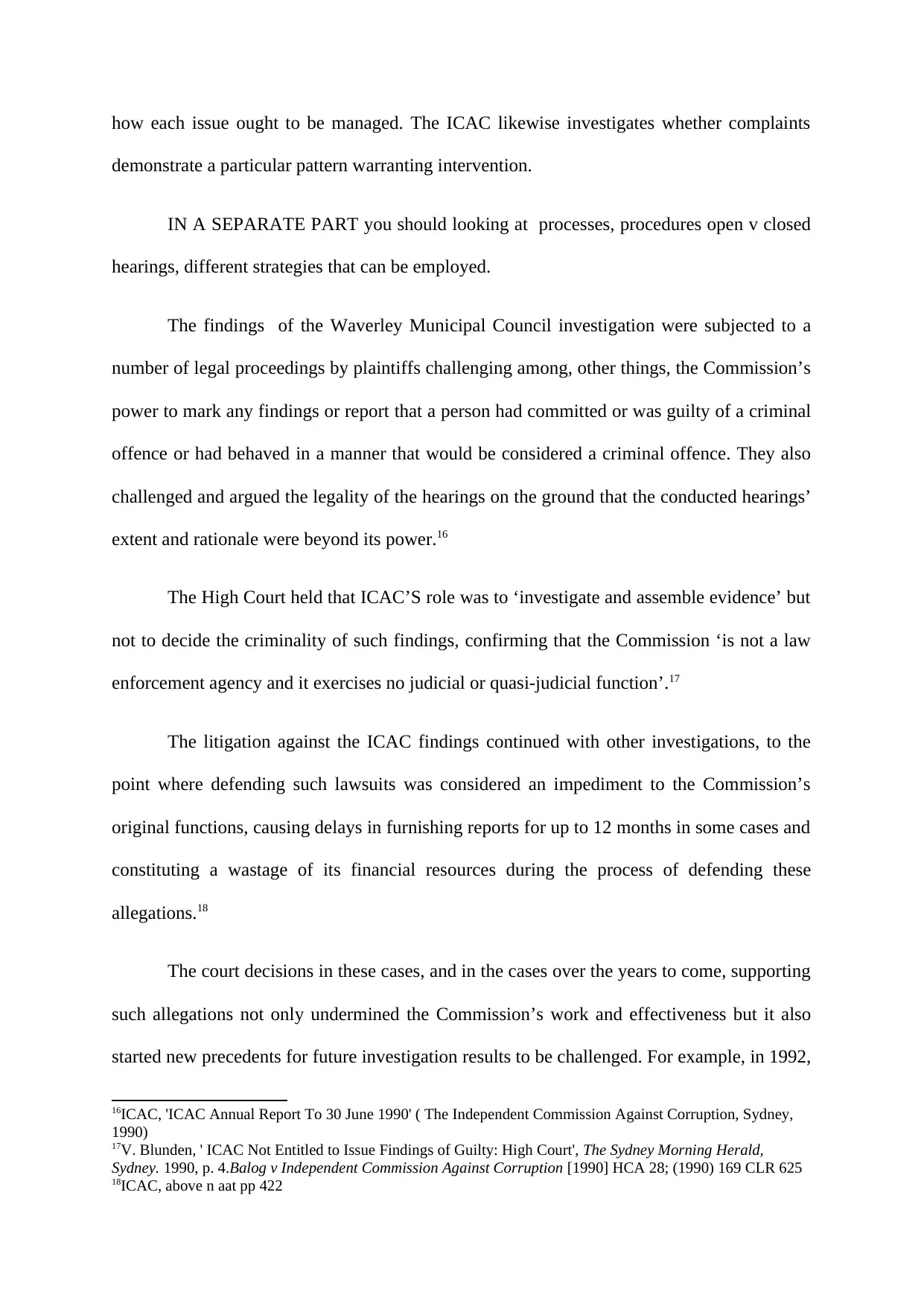
how each issue ought to be managed. The ICAC likewise investigates whether complaints
demonstrate a particular pattern warranting intervention.
IN A SEPARATE PART you should looking at processes, procedures open v closed
hearings, different strategies that can be employed.
The findings of the Waverley Municipal Council investigation were subjected to a
number of legal proceedings by plaintiffs challenging among, other things, the Commission’s
power to mark any findings or report that a person had committed or was guilty of a criminal
offence or had behaved in a manner that would be considered a criminal offence. They also
challenged and argued the legality of the hearings on the ground that the conducted hearings’
extent and rationale were beyond its power.16
The High Court held that ICAC’S role was to ‘investigate and assemble evidence’ but
not to decide the criminality of such findings, confirming that the Commission ‘is not a law
enforcement agency and it exercises no judicial or quasi-judicial function’.17
The litigation against the ICAC findings continued with other investigations, to the
point where defending such lawsuits was considered an impediment to the Commission’s
original functions, causing delays in furnishing reports for up to 12 months in some cases and
constituting a wastage of its financial resources during the process of defending these
allegations.18
The court decisions in these cases, and in the cases over the years to come, supporting
such allegations not only undermined the Commission’s work and effectiveness but it also
started new precedents for future investigation results to be challenged. For example, in 1992,
16ICAC, 'ICAC Annual Report To 30 June 1990' ( The Independent Commission Against Corruption, Sydney,
1990)
17V. Blunden, ' ICAC Not Entitled to Issue Findings of Guilty: High Court', The Sydney Morning Herald,
Sydney. 1990, p. 4.Balog v Independent Commission Against Corruption [1990] HCA 28; (1990) 169 CLR 625
18ICAC, above n aat pp 422
demonstrate a particular pattern warranting intervention.
IN A SEPARATE PART you should looking at processes, procedures open v closed
hearings, different strategies that can be employed.
The findings of the Waverley Municipal Council investigation were subjected to a
number of legal proceedings by plaintiffs challenging among, other things, the Commission’s
power to mark any findings or report that a person had committed or was guilty of a criminal
offence or had behaved in a manner that would be considered a criminal offence. They also
challenged and argued the legality of the hearings on the ground that the conducted hearings’
extent and rationale were beyond its power.16
The High Court held that ICAC’S role was to ‘investigate and assemble evidence’ but
not to decide the criminality of such findings, confirming that the Commission ‘is not a law
enforcement agency and it exercises no judicial or quasi-judicial function’.17
The litigation against the ICAC findings continued with other investigations, to the
point where defending such lawsuits was considered an impediment to the Commission’s
original functions, causing delays in furnishing reports for up to 12 months in some cases and
constituting a wastage of its financial resources during the process of defending these
allegations.18
The court decisions in these cases, and in the cases over the years to come, supporting
such allegations not only undermined the Commission’s work and effectiveness but it also
started new precedents for future investigation results to be challenged. For example, in 1992,
16ICAC, 'ICAC Annual Report To 30 June 1990' ( The Independent Commission Against Corruption, Sydney,
1990)
17V. Blunden, ' ICAC Not Entitled to Issue Findings of Guilty: High Court', The Sydney Morning Herald,
Sydney. 1990, p. 4.Balog v Independent Commission Against Corruption [1990] HCA 28; (1990) 169 CLR 625
18ICAC, above n aat pp 422
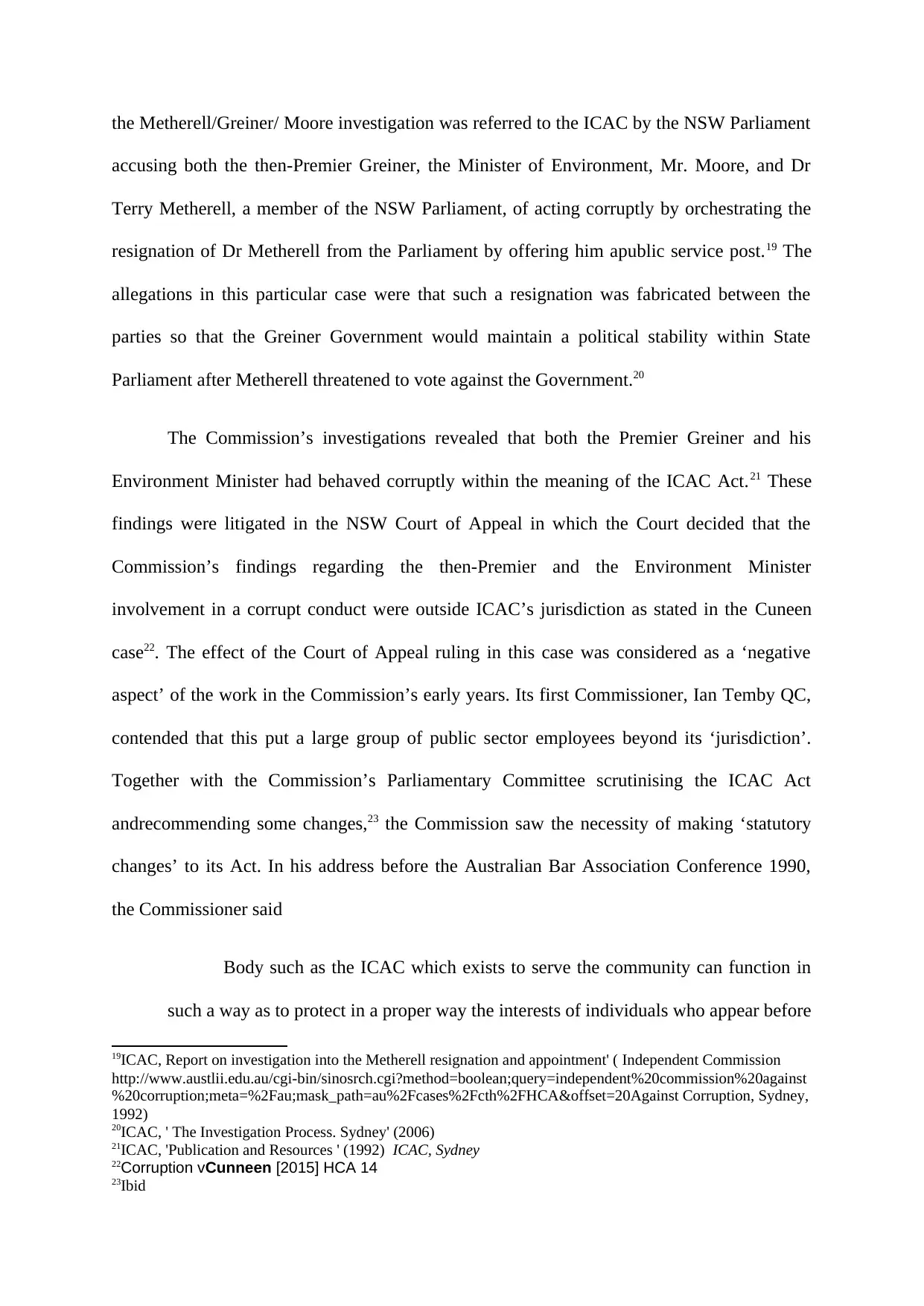
the Metherell/Greiner/ Moore investigation was referred to the ICAC by the NSW Parliament
accusing both the then-Premier Greiner, the Minister of Environment, Mr. Moore, and Dr
Terry Metherell, a member of the NSW Parliament, of acting corruptly by orchestrating the
resignation of Dr Metherell from the Parliament by offering him apublic service post.19 The
allegations in this particular case were that such a resignation was fabricated between the
parties so that the Greiner Government would maintain a political stability within State
Parliament after Metherell threatened to vote against the Government.20
The Commission’s investigations revealed that both the Premier Greiner and his
Environment Minister had behaved corruptly within the meaning of the ICAC Act.21 These
findings were litigated in the NSW Court of Appeal in which the Court decided that the
Commission’s findings regarding the then-Premier and the Environment Minister
involvement in a corrupt conduct were outside ICAC’s jurisdiction as stated in the Cuneen
case22. The effect of the Court of Appeal ruling in this case was considered as a ‘negative
aspect’ of the work in the Commission’s early years. Its first Commissioner, Ian Temby QC,
contended that this put a large group of public sector employees beyond its ‘jurisdiction’.
Together with the Commission’s Parliamentary Committee scrutinising the ICAC Act
andrecommending some changes,23 the Commission saw the necessity of making ‘statutory
changes’ to its Act. In his address before the Australian Bar Association Conference 1990,
the Commissioner said
Body such as the ICAC which exists to serve the community can function in
such a way as to protect in a proper way the interests of individuals who appear before
19ICAC, Report on investigation into the Metherell resignation and appointment' ( Independent Commission
http://www.austlii.edu.au/cgi-bin/sinosrch.cgi?method=boolean;query=independent%20commission%20against
%20corruption;meta=%2Fau;mask_path=au%2Fcases%2Fcth%2FHCA&offset=20Against Corruption, Sydney,
1992)
20ICAC, ' The Investigation Process. Sydney' (2006)
21ICAC, 'Publication and Resources ' (1992) ICAC, Sydney
22Corruption vCunneen [2015] HCA 14
23Ibid
accusing both the then-Premier Greiner, the Minister of Environment, Mr. Moore, and Dr
Terry Metherell, a member of the NSW Parliament, of acting corruptly by orchestrating the
resignation of Dr Metherell from the Parliament by offering him apublic service post.19 The
allegations in this particular case were that such a resignation was fabricated between the
parties so that the Greiner Government would maintain a political stability within State
Parliament after Metherell threatened to vote against the Government.20
The Commission’s investigations revealed that both the Premier Greiner and his
Environment Minister had behaved corruptly within the meaning of the ICAC Act.21 These
findings were litigated in the NSW Court of Appeal in which the Court decided that the
Commission’s findings regarding the then-Premier and the Environment Minister
involvement in a corrupt conduct were outside ICAC’s jurisdiction as stated in the Cuneen
case22. The effect of the Court of Appeal ruling in this case was considered as a ‘negative
aspect’ of the work in the Commission’s early years. Its first Commissioner, Ian Temby QC,
contended that this put a large group of public sector employees beyond its ‘jurisdiction’.
Together with the Commission’s Parliamentary Committee scrutinising the ICAC Act
andrecommending some changes,23 the Commission saw the necessity of making ‘statutory
changes’ to its Act. In his address before the Australian Bar Association Conference 1990,
the Commissioner said
Body such as the ICAC which exists to serve the community can function in
such a way as to protect in a proper way the interests of individuals who appear before
19ICAC, Report on investigation into the Metherell resignation and appointment' ( Independent Commission
http://www.austlii.edu.au/cgi-bin/sinosrch.cgi?method=boolean;query=independent%20commission%20against
%20corruption;meta=%2Fau;mask_path=au%2Fcases%2Fcth%2FHCA&offset=20Against Corruption, Sydney,
1992)
20ICAC, ' The Investigation Process. Sydney' (2006)
21ICAC, 'Publication and Resources ' (1992) ICAC, Sydney
22Corruption vCunneen [2015] HCA 14
23Ibid
⊘ This is a preview!⊘
Do you want full access?
Subscribe today to unlock all pages.

Trusted by 1+ million students worldwide
1 out of 59
Related Documents
Your All-in-One AI-Powered Toolkit for Academic Success.
+13062052269
info@desklib.com
Available 24*7 on WhatsApp / Email
![[object Object]](/_next/static/media/star-bottom.7253800d.svg)
Unlock your academic potential
Copyright © 2020–2026 A2Z Services. All Rights Reserved. Developed and managed by ZUCOL.





